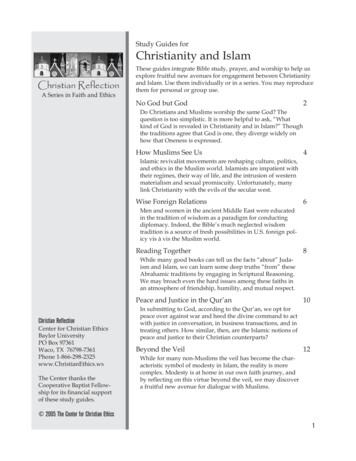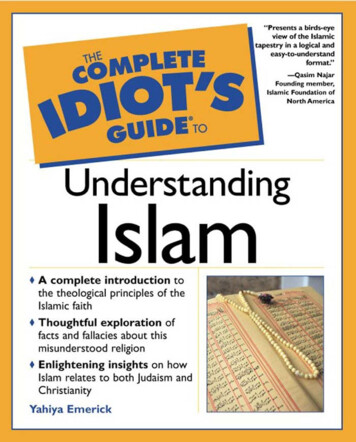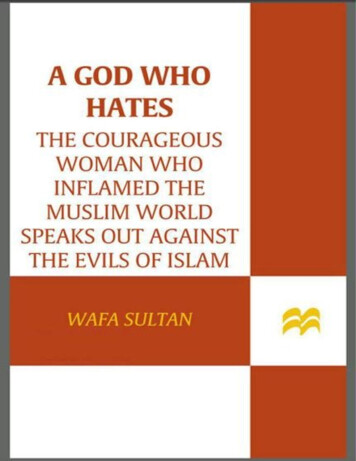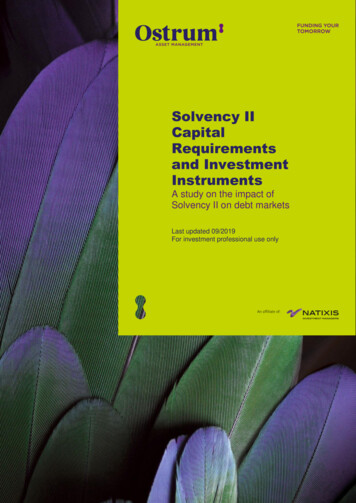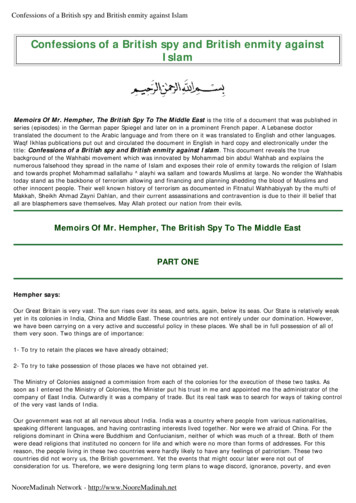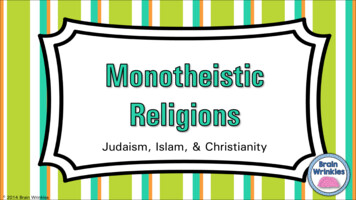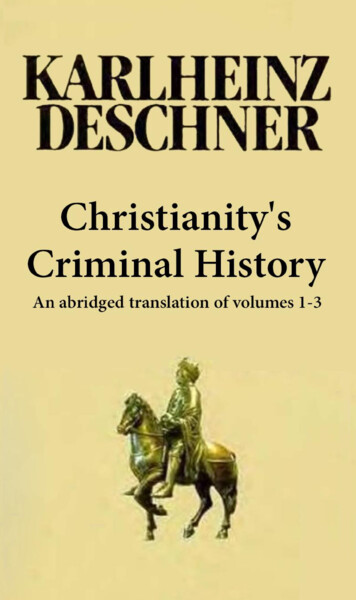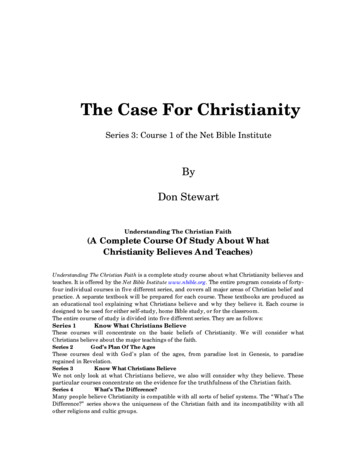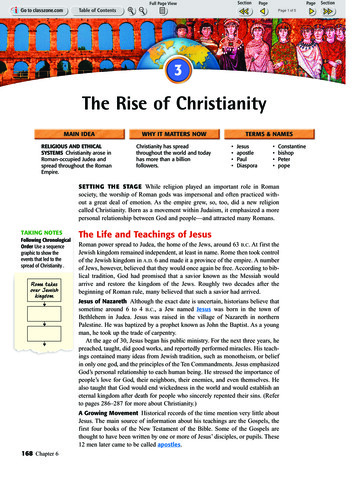
Transcription
Tolera nce and Tension:Islam and Christianityin Sub-Saharan AfricaFunded with generous support from The Pew Charitable Trustsand The John Templeton FoundationPew Forum on Religion & Public LifeApril 2010
Pew Forum on Religion & Public Life / Islam and Christianity in Sub-Saharan Africa About the Pew Forum on Religion & Public Life This report was produced by the Pew Research Center’s Forum on Religion & Public Life. The Pew Forum deliverstimely, impartial information on issues at the intersection of religion and public affairs. The Pew Forum is a nonpartisan,nonadvocacy organization and does not take positions on policy debates. Based in Washington, D.C., the Pew Forum isa project of the Pew Research Center, which is funded by The Pew Charitable Trusts.The report was funded by generous grants from The Pew Charitable Trusts and the John Templeton Foundation as partof the Pew-Templeton Global Religious Futures Project, which aims to increase people’s knowledge of religion aroundthe world.The report is a collaborative effort based on the input and analysis of the following individuals:Pew Forum on Religion & Public Life Luis Lugo, DirectorPew Research CenterSurvey ResearchAlan Cooperman, Associate Director, ResearchGregory Smith, Senior ResearcherAllison Pond and Neha Sahgal, Research AssociatesScott Clement, Research Analyst Demographic and Other ResearchBrian J. Grim, Senior ResearcherConrad Hackett, DemographerJacqueline Wenger, Research AssociateSahar Chaudhry, Research AnalystElizabeth Podrebarac, Research AssistantKathleen Holzwart Sprehe, Research Associate,Pew Global Attitudes Project EditorialVisit http://features.pewforum.org/africa/ for the onlinepresentation of “Tolerance and Tension: Islam andChristianity in Sub-Saharan Africa.”Sandra Stencel, Associate Director, EditorialDiana Yoo, Graphic DesignerTracy Miller, EditorHilary Ramp, Assistant Editor Communications and Web PublishingErin O’Connell, Associate Director, CommunicationsKathleen Flynn, Planning and Operations ManagerOliver Read, Web ManagerBrian Bailey, Online Project ManagerMary Schultz, Communications ManagerRobert Mills, Communications AssociateLiga Plaveniece, Program Coordinator Andrew Kohut, PresidentPaul Taylor, Executive Vice PresidentScott Keeter, Director of Survey ResearchElizabeth Mueller Gross, Vice PresidentMichael Piccorossi, Director of OperationsRussell Heimlich, Web DeveloperRichard Wike, Associate Director,Pew Global Attitudes ProjectErin Carriere-Kretschmer andJuliana Menasce Horowitz, Senior Researchers,Pew Global Attitudes ProjectPew Forum on Religion & Public Life1615 L St., NW, Suite 700Washington, D.C. 20036-5610Phone (202) 419-4550Fax (202) 419-4559www.pewforum.org 2010 Pew Research Center Photo: Sebastien Desarmaux / GODONG/Godong/Corbiswww.pewforum.orgi
Pew Forum on Religion & Public Life / Islam and Christianity in Sub-Saharan Africa Table of Contents Preface .iExecutive Summary . 1Chapter 1: Religious Affiliation . 19Chapter 2: Commitment to Christianity and Islam . 25Chapter 3: Traditional African Religious Beliefs and Practices . 33Chapter 4: Interreligious Harmony and Tensions . 36Chapter 5: Religion and Society . 48Appendix A: Glossary of Terms . 59Appendix B: Religious Demography . 62Appendix C: Survey Methodology . 65The survey questionnaire and a topline with full results for the 19 countries surveyed is availableon the Pew Forum’s website at http://pewforum.org/docs/?DocID 524.www.pewforum.orgiii
Pew Forum on Religion & Public Life / Islam and Christianity in Sub-Saharan Africa PrefaceIn little more than a century, the religious landscape of sub-Saharan Africa has changeddramatically. As of 1900, both Muslims and Christians were relatively small minorities in theregion. The vast majority of people practiced traditional African religions, while adherents ofChristianity and Islam combined made up less than a quarter of the population, according tohistorical estimates from the World Religion Database.Since then, however, the number of Muslims living between the Sahara Desert and the Capeof Good Hope has increased more than 20-fold, rising from an estimated 11 million in 1900 toapproximately 234 million in 2010. The number of Christians has grown even faster, soaringalmost 70-fold from about 7 million to 470 million. Sub-Saharan Africa now is home to aboutone-in-five of all the Christians in the world (21%) and more than one-in-seven of the world’sMuslims (15%).1Growth of Islam & Christianity in Sub-Saharan Africa Since 1900Source: World Religion Database. Historical data draw on government records, historical atlases and reports of religious organizations at thetime. Later figures draw on U.N. population estimates, surveys and censuses.Pew Forum on Religion & Public Life, April 2010 1The 15% estimate is based on data from the Pew Forum’s 2009 report, “Mapping the Global Muslim Population”;other estimates based on data from the World Religion Database.www.pewforum.orgi
Pew Forum on Religion & Public Life / Islam and Christianity in Sub-Saharan Africa While sub-Saharan Africa has almost twice as many Christians as Muslims, on the African continentas a whole the two faiths are roughly balanced, with 400 million to 500 million followers each.Since northern Africa is heavily Muslim and southern Africa is heavily Christian, the great meetingplace is in the middle, a 4,000-mile swath from Somalia in the east to Senegal in the west.Muslims and Christians in AfricaThis map shows the ratio of Muslims to Christiansin each country and province. The north is heavily Muslim,and the south is heavily Christian.To some outside observers,this is a volatile religiousfault line – the site, forexample, of al-Qaeda’s firstmajor terrorist strike, thebombingoftheU.S.embassies in Kenya andTanzania in 1998, and morerecently of ethnic andsectarianbloodshedinNigeria, where hundreds ofMuslims and Christianshave been killed.To others, religion is not somuch a source of conflict asa source of hope in subSaharanAfrica,wherereligiousleadersandmovements are a majorforce in civil society and akey provider of relief anddevelopment for the needy,particularlygiventhewidespread reality of failedstatesandcollapsinggovernment services.Sources: censuses, demographic and health surveys,and the World Religion DatabasePew Forum on Religion & Public Life, April 2010But how do sub-SaharanAfricans themselves viewthe role of religion in their lives and societies? To address this question, the Pew ResearchCenter’s Forum on Religion & Public Life, with generous funding from The Pew Charitable Trustsand the John Templeton Foundation, conducted a major public opinion survey involving morethan 25,000 face-to-face interviews in more than 60 languages or dialects in 19 countries,representing 75% of the total population of sub-Saharan Africa.www.pewforum.orgii
Pew Forum on Religion & Public Life / Islam and Christianity in Sub-Saharan Africa Our survey asked people to describe their religious beliefs and practices. We sought to gaugetheir knowledge of, and attitudes toward, other faiths. We tried to assess their degree ofpolitical and economic satisfaction; their concerns about crime, corruption and extremism; theirpositions on issues such as abortion and polygamy; and their views of democracy, religious lawand the place of women in society.The resulting report offers a detailed and in some ways surprising portrait of religion andsociety in a wide variety of countries, some heavily Muslim, some heavily Christian and somemixed. Africans have long been seen as devout and morally conservative, and the surveylargely confirms this. But insofar as the conventional wisdom has been that Africans are lackingin tolerance for people of other faiths, it may need rethinking.The report also may pose some apparent paradoxes, at least to Western readers. The surveyfindings suggest that many Africans are deeply committed to Islam or Christianity and yetcontinue to practice elements of traditional African religions. Many support democracy and sayit is a good thing that people from other religions are able to practice their faith freely. At thesame time, they also favor making the Bible or sharia law the official law of the land. And whileboth Muslims and Christians recognize positive attributes in one another, tensions lie close tothe surface.It is our hope that the survey will contribute to a better understanding of the role religion playsin the private and public lives of the approximately 820 million people living in sub-SaharanAfrica. This report is part of a larger effort – the Pew-Templeton Global Religious FuturesProject – that aims to increase people’s knowledge of religion around the world.In preparing this survey, the Pew Forum sought the counsel of scholars with expertise in subSaharan Africa. Peter Lewis, associate professor and director of African Studies at JohnsHopkins School of Advanced International Studies, served as a special adviser to the project.We also received invaluable assistance from Amaney Jamal, assistant professor in theDepartment of Politics at Princeton University and a Pew Forum consultant on global Islam, andTimothy Samuel Shah, senior research fellow at the Institute on Culture, Religion and WorldAffairs at Boston University and a Pew Forum consultant on global Christianity.Many others advised us in the conceptualization and development of the survey, and we wouldlike to extend special thanks to the following individuals: Teresa Cruz e Silva, Center for AfricanStudies, University of Eduardo Mondlane, Maputo, Mozambique; Stephen Ellis, African StudiesCentre, The Netherlands; Tibebe Eshete, Michigan State University; Christopher Fomunyoh,National Democratic Institute for International Affairs; Rosalind Hackett, Department ofReligious Studies, University of Tennessee, Knoxville; Ogbu Kalu (deceased), McCormickTheological Seminary; Gina Lambright, Elliott School of International Affairs, GeorgeWashington University; Peter Mandaville, Department of Public and International Affairs,George Mason University; David Maxwell, School of History, Keele University; Ali Mazrui,Institute of Global Cultural Studies, Binghamton University, State University of New York;www.pewforum.orgiii
Pew Forum on Religion & Public Life / Islam and Christianity in Sub-Saharan Africa Sulayman Nyang, African Studies Department, Howard University; John Paden, School ofPublic Policy, George Mason University; Dana Robert, School of Theology, Center for GlobalChristianity & Mission, Boston University; Lamin Sanneh, Yale Divinity School; Gerrie Ter Haar,International Institute of Social Studies, Erasmus University, Rotterdam, The Netherlands; andR. Bruce Yoder, Mennonite Mission Network (on study leave at Boston University). Thefieldwork for this survey was carried out by Princeton Survey Research AssociatesInternational, led by PSRAI President Mary McIntosh.The survey design was guided by the counsel of our advisers, contractors and consultants, butthe Pew Forum is solely responsible for the interpretation and reporting of the data.– Luis Lugo and Alan Coopermanwww.pewforum.orgiv
Pew Forum on Religion & Public Life / Islam and Christianity in Sub-Saharan Africa Sub-Saharan AfricaThis map highlights in bold the 19 countries in sub-Saharan Africa where the PewResearch Center’s Forum on Religion & Public Life conducted public opinion surveys.Source: United NationsPew Forum on Religion & Public Life, April 2010www.pewforum.orgv
Pew Forum on Religion & Public Life / Islam and Christianity in Sub-Saharan Africa Executive SummaryThe vast majority of people in many sub-Saharan African nations are deeply committed to thepractices and major tenets of one or the other of the world’s two largest religions, Christianityand Islam. Large majorities say they belong to one of these faiths, and, in sharp contrast withEurope and the United States, very few people are religiously unaffiliated. Despite thedominance of Christianity and Islam, traditional African religious beliefs and practices (see box,p. 6) have not disappeared. Rather, they coexist with Islam and Christianity. Whether or not thisentails some theological tension, it is a reality in people’s lives: Large numbers of Africansactively participate in Christianity or Islam yet also believe in witchcraft, evil spirits, sacrifices toancestors, traditional religious healers, reincarnation and other elements of traditional Africanreligions.1Christianity and Islam also coexist with each other. Many Christians and Muslims in subSaharan Africa describe members of the other faith as tolerant and honest. In most countries,relatively few see evidence of widespread anti-Muslim or anti-Christian hostility, and on thewhole they give their governments high marks for treating both religious groups fairly. But theyacknowledge that they know relatively little about each other’s faith, and substantial numbersof African Christians (roughly 40% or more in a dozen nations) say they consider Muslims to beviolent. Muslims are significantly more positive in their assessment of Christians thanChristians are in their assessment of Muslims.There are few significant gaps, however, in the degree of support among Christians andMuslims for democracy. Regardless of their faith, most sub-Saharan Africans say they favordemocracy and think it is a good thing that people from other religions are able to practice theirfaith freely. At the same time, there is substantial backing among Muslims and Christians alikefor government based on either the Bible or sharia law, and considerable support amongMuslims for the imposition of severe punishments such as stoning people who commitadultery.These are among the key findings from more than 25,000 face-to-face interviews conducted onbehalf of the Pew Research Center’s Forum on Religion & Public Life in more than 60languages or dialects in 19 sub-Saharan African nations from December 2008 to April 2009. (Foradditional details, see the survey methodology section at the end of this report.) The countrieswere selected to span this vast geographical region and to reflect different colonial histories,linguistic backgrounds and religious compositions. In total, the countries surveyed containthree-quarters of the total population of sub-Saharan Africa. 1For a 2009 Pew Forum analysis of the extent to which Americans also mix and match elements of diverse religioustraditions, see http://pewforum.org/docs/?DocID 490www.pewforum.org1
Pew Forum on Religion & Public Life / Islam and Christianity in Sub-Saharan Africa Other FindingsIn addition, the 19-nation survey finds: Africans generally rank unemployment, crime and corruption as bigger problems than religiousconflict. However, substantial numbers of people (including nearly six-in-ten Nigerians andRwandans) say religious conflict is a very big problem in their country. The degree of concern about religious conflict varies from country to country but tracks closely withthe degree of concern about ethnic conflict in many countries, suggesting that they are often related. Many Africans are concerned about religious extremism, including within their own faith. Indeed,many Muslims say they are more concerned about Muslim extremism than about Christianextremism, and Christians in four countries say they are more concerned about Christian extremismthan about Muslim extremism. Neither Christianity nor Islam is growing significantly in sub-Saharan Africa at the expense of theother; there is virtually no net change in either direction through religious switching. At least half of all Christians in every country surveyed expect that Jesus will return to earth in theirlifetime, while roughly 30% or more of Muslims expect to live to see the re-establishment of thecaliphate, the golden age of Islamic rule. People who say violence against civilians in defense of one’s religion is rarely or never justifiedvastly outnumber those who say it is sometimes or often justified. But substantial minorities (20%or more) in many countries say violence against civilians in defense of one’s religion is sometimesor often justified. In most countries, at least half of Muslims say that women should not have the right to decidewhether to wear a veil, saying instead that the decision should be up to society as a whole. Circumcision of girls (female genital cutting) is highest in the predominantly Muslim countries ofMali and Djibouti but is more common among Christians than among Muslims in Uganda. Majorities in almost every country say that Western music, movies and television have harmedmorality in their nation. Yet majorities in most countries also say they personally like Westernentertainment. In most countries, more than half of Christians believe in the prosperity gospel – that God will grantwealth and good health to people who have enough faith. By comparison with people in many other regions of the world, sub-Saharan Africans are muchmore optimistic that their lives will change for the better.www.pewforum.org2
Pew Forum on Religion & Public Life / Islam and Christianity in Sub-Saharan Africa Adherence to Islam andChristianity Importance of Religion% saying religion is very important in their livesLarge majorities in all the countriessurveyed say they believe in oneGod and in heaven and hell, andlarge numbers of Christians andMuslims alike believe in the literaltruth of their scriptures (either theBible or the Koran). Most people alsosay they attend worship services atleast once a week, pray every day (inthe case of Muslims, generally fivetimes a day), fast during the holyperiods of Ramadan or Lent, andgive religious alms (tithing forChristians, zakat for Muslims; seethe glossary of terms for moreinformation about tithing and zakat).Indeed, sub-Saharan Africa is clearlyamong the most religious places inthe world. In many countries acrossthe continent, roughly nine-in-tenpeople or more say religion is veryimportant in their lives. By this keymeasure, even the least religiouslyinclined nations in the region scorehigher than the United States, whichis among the most religious of theadvanced industrial countries.Q42. How important is religion in your life – veryimportant, somewhat important, not too important,or not at all important?Source for U.S. data: 2009 survey by the Pew Forum onReligion & Public Life and the Pew Research Center forthe People & the PressSources for other non-African countries: 2009, 2008and 2007 surveys by the Pew Global Attitudes Project. www.pewforum.org3
Pew Forum on Religion & Public Life / Islam and Christianity in Sub-Saharan Africa Persistence of Traditional African Religious PracticesAt the same time, many of those whoindicate they are deeply committed tothe practice of Christianity or Islamalso incorporate elements of Africantraditional religions into their dailylives. For example, in four countries(Tanzania, Mali, Senegal and SouthAfrica) more than half the peoplesurveyed believe that sacrifices toancestors or spirits can protect themfrom harm.Sizable percentages of both Christiansand Muslims – a quarter or more inmany countries – say they believe inthe protective power of juju (charmsor amulets). Many people also saythey consult traditional religioushealers when someone in theirhousehold is sick, and sizableminorities in several countries keepsacred objects such as animal skinsand skulls in their homes andparticipate in ceremonies to honortheirancestors.Andalthoughrelatively few people today identifythemselves primarily as followers of atraditional African religion, manypeople in several countries say theyhave relatives who identify with thesetraditional faiths. Belief in the Protective Power of Sacrificesto Spirits or Ancestors% who believe sacrifices to spirits or ancestors canprotect them from bad things happeningMedian results:Among general population in Q51i. Which, if any, of the following do you believe in? That sacrifices tospirits or ancestors can protect you from bad things happening.www.pewforum.org4
Pew Forum on Religion & Public Life / Islam and Christianity in Sub-Saharan Africa What Is a Median?The median is the middle number in a list of numbers sorted from highest to lowest. For manyquestions in this report, medians are shown to help readers see differences between Muslim andChristian subpopulations and general populations, or to highlight differences between sub-SaharanAfrica and other parts of the world.In charts showing results from all 19 countries on a particular question, the median for “allcountries” is the 10th spot on the list. In charts where there is an even number of countries in thelist and there is no country exactly in the middle, the median is computed as the average of thetwo countries at the middle of the list (e.g., where 16 nations are shown, the median is theaverage of the 8th and 9th countries on the list).To help readers see whether Muslims and Christians differ significantly on certain questions,separate medians for Christians and Muslims also are shown. The median for Christians is basedon the survey results among Christians in each of the 16 countries with a Christian populationlarge enough to analyze. The median for Muslims is based on the survey results among Muslimsin each of the 15 countries with a Muslim population large enough to analyze.www.pewforum.org5
Pew Forum on Religion & Public Life / Islam and Christianity in Sub-Saharan Africa Quick Definition: African Traditional ReligionsHanded down over generations, indigenous African religions have no formal creeds or sacred textscomparable to the Bible or Koran. They find expression, instead, in oral traditions, myths, rituals,festivals, shrines, art and symbols. In the past, Westerners sometimes described them asanimism, paganism, ancestor worship or simply superstition, but today scholars acknowledge theexistence of sophisticated African traditional religions whose primary role is to provide for humanwell-being in the present as opposed to offering salvation in a future world.Because beliefs and practices vary across ethnic groups and regions, some experts perceive amultitude of different traditional religions in Africa. Others point to unifying themes and, thus,prefer to think of a single faith with local differences.In general, traditional religion in Africa is characterized by belief in a supreme being who createdand ordered the world but is often experienced as distant or unavailable to humans. Lesserdivinities or spirits who are more accessible are sometimes believed to act as intermediaries. Anumber of traditional myths explain the creation and ordering of the world and provideexplanations for contemporary social relationships and norms. Lapsed social responsibilities orviolations of taboos are widely believed to result in hardship, suffering and illness for individuals orcommunities and must be countered with ritual acts to re-establish order, harmony and well-being.Ancestors, considered to be in the spirit world, are believed to be part of the human community.Believers hold that ancestors sometimes act as emissaries between living beings and the divine,helping to maintain social order and withdrawing their support if the living behave wrongly.Religious specialists, such as diviners and healers, are called upon to discern what infractions areat the root of misfortune and to prescribe the appropriate rituals or traditional medicines to setthings right.African traditional religions tend to personify evil. Believers often blame witches or sorcerers forattacking their life-force, causing illness or other harm. They seek to protect themselves with ritualacts, sacred objects and traditional medicines. African slaves carried these beliefs and practices tothe Americas, where they have evolved into religions such as Voodoo in Haiti and Santeria in Cuba.www.pewforum.org6
Pew Forum on Religion & Public Life / Islam and Christianity in Sub-Saharan Africa Tolerance, but Also TensionsThe survey finds that onseveralmeasures,manyMuslims and Christians holdfavorable views of each other.MuslimsgenerallysayChristians are tolerant, honestand respectful of women, andin most countries half or moreChristians say Muslims arehonest, devout and respectfulof women. In roughly half thecountries surveyed, majoritiesalso say they trust people whohave different religious valuesthan their own.Sizable majorities in everycountry surveyed say thatpeople of different faiths arevery free to practice theirreligion, and most add thatthis is a good thing ratherthan a bad thing. In mostcountries, majorities say it isall right if their politicalleaders are of a differentreligion than their own. Andin most countries, significantminorities (20% or more) ofpeople who attend religiousservices say that theirmosque or church worksacross religious lines toaddress community problems.Most Think Others Are Very Free to Practice TheirReligion and See This as a Good Thing% who see others as very free to practice faith and think this is a Total Very Free93928786868686818180807877747471696665 Q18. And in our country, how free are people from religions different than yours topractice their religion? Do you feel they are very free to practice their religion,somewhat free, not too free, or not at all free to practice their religion?Q19. And is this a good thing or a bad thing?www.pewforum.org7
Pew Forum on Religion & Public Life / Islam and Christianity in Sub-Saharan Africa On the other hand, the survey alsoreveals clear signs of tension anddivision. Overall, Christians areless positive in their views ofMuslims than Muslims are ofChristians; substantial numbers ofChristians (ranging from 20% inGuinea Bissau to 70% in Chad)say they think of Muslims asviolent. In a handful of countries, athird or more of Christians saymany or most Muslims are hostiletoward Christians, and in a fewcountries a third or more ofMuslims say many or mostChristians are hostile towardMuslims. Muslims More Widely Seen as Violent than Christians% of Christians who see Muslims as violentBy their own reckoning, neitherChristians nor Muslims in theregion know very much abouteach other’s faith. In mostcountries, fewer than half ofChristians say they know eithersome or a great deal about Islam,and fewer than half of Muslimssay they know either some or agreat deal about Christianity.Moreover,peopleinmostcountries surveyed, especiallyChristians, tend to view the twofaiths as very different rather thanas having a lot in common. Andmany people say they are notcomfortable with the idea of theirchildren marrying a spouse fromoutside their religion.% of Muslims who see Christians as violent Q28b. Which of these characteristics do you associate with Muslims? Do youassociate this with Muslims, or not? Violent.Q29b. Which of these characteristics do you associate with Christians? Do youassociate this with Christians, or not? Violent.www.pewforum.org8
Pew Forum on Religion & Public Life / Islam and Christianity in Sub-Saharan Africa People throughout the region generally see conflict between religious groups as a modestproblem compared with other issues such as unemployment, crime and corruption. Still,substantial numbers in all the countries surveyed except Botswana and Zambia say religiousconflict is a very big problem in their country, reaching a high of 58% in Nigeria and Rwanda. Inaddition, substantial minorities (20% ormore) in many countries say thatViews of Religious Conflict% saying conflict between religious groups is aviolence against civilians in defense ofvery big problem in their countryone’s religion can sometimes or oftenbe justified. And large numbers (moreMedian results:than 40%) in nearly every countryexpress concern about extremistreligious groups in their nation,Among general population in including within their own religiouscommunity in some instances. Indeed,in almost all countries in whichMuslims constitute at least 10% of thepopulation,Muslimsaremoreconcerned about Muslim nafewoverwhelmingly Christian countries,including South Africa, Christians aremore concerned about ChristianextremismthanaboutMuslimextremism. And in many countries,sizable numbers express concern aboutboth Muslim and Christian extremism. Q8b. Here is a list of things that may be problems in our country.As I read each one, please tell me if you think it is a very big problem, amoderately big problem, a small problem, or not a problem at all.Conflict between religious groups.www.pewforum.org9
Pew Forum on Religion & Public Life / Islam and Christianity in Sub-Saharan Africa Support for Both Democracy and Religious LawAcross the sub-Saharan region, large numbers of people express strong support for democracyand say it is a good thing that people from religions different than their own are able to practicetheir faith freely. Asked whether democracy is preferable to any other kind of government or“in some circumstances, a nondemocratic government can be preferable,” strong majorities inevery country choose democracy. In most places there is no significant difference betweenMuslims and Christians on this question.At the same time, there is subst
Hopkins School of Advanced International Studies, served as a special adviser to the project. . African Studies Department, Howard University; John Paden, School of Public Policy, George Mason University; Dana Robert, School of Theology, Center for Global . Christianity & Mission, Boston University; Lamin Sanneh, Yale Divinity School .
